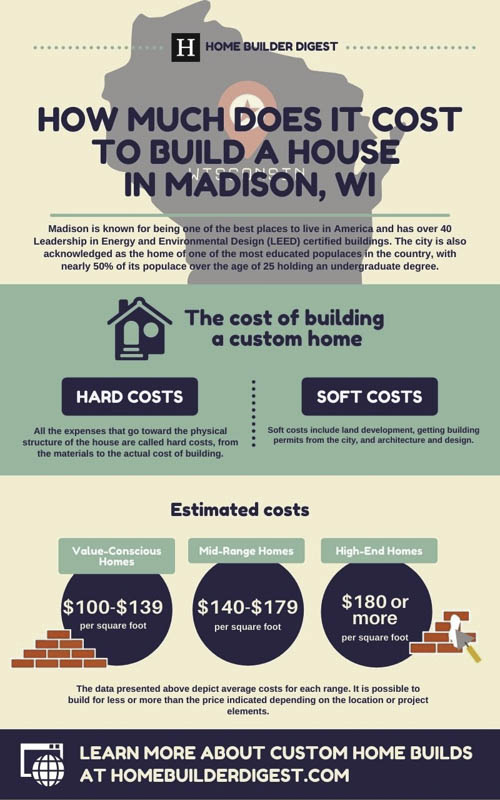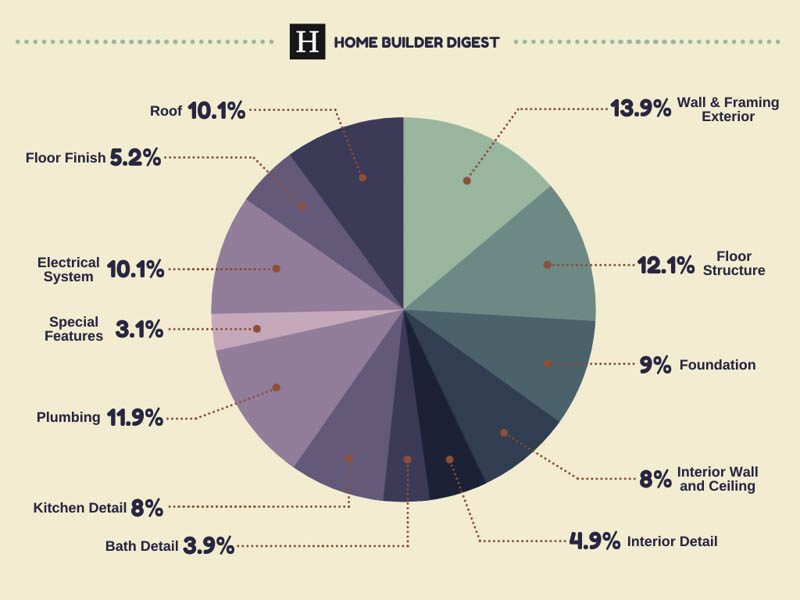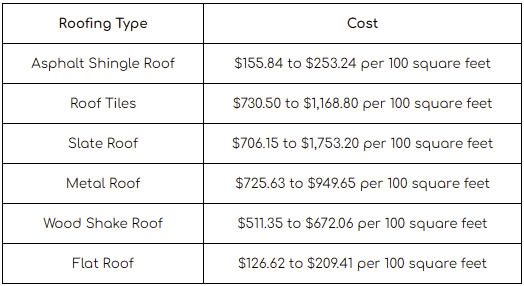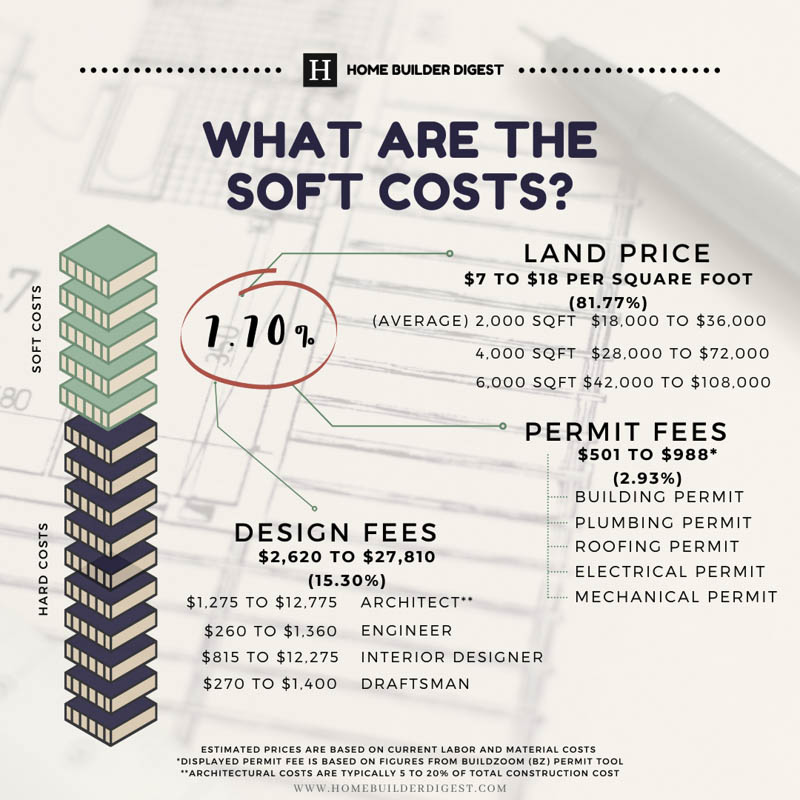Home » Cost Guides » Wisconsin Cost Guides » How Much Does it Cost to Build a House in Madison?
Madison is known for being one of the best places to live in America and has over 40 Leadership in Energy and Environmental Design (LEED) certified buildings. The city is also acknowledged as the home of one of the most educated populaces in the country, with nearly 50% of its populace over the age of 25 holding an undergraduate degree. Recent city performance analysis shows that Madison’s economy is currently undergoing recovery from the effects of the COVID-19 pandemic. The service and production sectors have experienced a complete employment rebound, which is partially due to growth in biotechnology and manufacturing.
The Cost of Building a Home in Madison

For the Madison construction industry, experts are cautiously optimistic regarding its performance in 2022. About 80% of home builders and 90% of remodelers have faced shortages in 2021 and the industry is hoping to improve its performance. Despite the labor shortage and supply chain issues, firms are working to meet the demand for homes.
The construction industry is now reevaluating which areas need to change. Given that experts see the labor shortage as a long-term problem, firms are being advised to keep their benefits and salary packages competitive, value employee input, and collaborate on workforce needs. Some firms have begun cooperating with school districts to foster and recruit talent.
Experts have also pointed out that the lack of access to child care and affordable housing are possible reasons for the thinning workforce. Access to child care is particularly important given the increase of women coming into the construction workforce, especially in Wisconsin as a whole.

Figure 1. Typical cost breakdown of a single-family home constructed using the conventional method, according to Home Builder Digest.
The average cost of new home construction in Madison is about $155 per square foot, which is considerably lower than the national average of $207 per square foot. The usual range of construction costs project owners will come across is $100 to $210 per square foot. Pricing will differ, depending on the project’s details. The more intricate and customized the design, the higher the cost.
On top of the construction costs, project owners will also have to take into account the hard and soft costs. Hard costs are associated with the aspects of construction that are physically part of the house, including framing, foundation, plumbing, flooring, and roofing. Soft costs, on the other hand, are things like land costs, permitting fees, and architectural and design costs. These costs are independent of each other.
Hard Costs
Basic and simple homes in the Madison area will usually be priced within the $100 to $139 per square foot range. For projects that have a little more detail, or are generally classified as mid-value type homes, project owners can expect to see services priced between $140 to $179 per square foot. Plans that have customized features and higher-end finishes will cost around $180 to $210 per square foot and above; these are classified as high-end homes in the Madison area. It should be noted, however, that the provided figures are estimates. Firms may charge more or less, depending on details like square footage and additional features.
On top of construction costs, project owners need to take into account the costs incurred from foundation, roofing, heating, ventilation, and air conditioning (HVAC), and electrical installation.
Madison’s roofing costs generally range between $126.62 to $1,753.20 per 100 square feet, depending on the roofing type. The following table provides price ranges that project owners can expect to see:

The cost for Major systems is a combination of HVAC, electrical, and plumbing. The following are the average costs for major systems: an HVAC system is about $1,953, while a plumbing system is $373, and electrical installation is $379.
Soft Costs
Soft costs cover the expenses that go beyond the actual building of the structure. The most well-known soft costs are land costs, permit fees, and architectural and design fees.

Figure 2. Soft cost percentage and average price range of additional fees, determined from the overall cost of custom home building in Madison.
Cost of the Land
Madison is currently experiencing population growth, with an annual growth rate of 0.69%. Compared to cities with stagnant or decreasing population growth, Madison’s land is more likely to increase in price.
Plots of land available for residential development in Madison on Zillow have an average cost of $133,223.53. The cheapest lot is located along Esker Drive and is being sold for $91,000. It is around 13,068 square feet. The most expensive lot, meanwhile, is around 13,503.6 square feet. It is located in Quinn Circle and is being sold for $200,000.
Moreover, lots on Redfin have a higher average price of $143,585. The cheapest lot, located along Grey Kestrel Drive, is $104,900 for 7,405 square feet. The most expensive lot is being sold for $300,000. It is located along Prospect Drive and is sized at 20,037.60 square feet.
Permits and Other Fees
Information for permit fees in Madison can be found on the local government website. The website provides several tables for different plan review fees, inspection fees, and zoning review fees. For new single or two-family residential buildings, the following are the basic required fees:
- Plan review fee: $100
- Inspection fees (minimum of $25)
- Building: $0.10 per square foot
- Electricity: $0.9 per square foot
- Plumbing: $0.9 per square foot
- HVAC: $0.9 per square foot
- Zoning fee: $0.03 per square foot (minimum of $25)
In addition to the aforementioned fees, the Building Inspection Division of the Department of Planning and Community and Economic Development will also collect fees for the following:
- State Seal fee as charged by the Department of Safety and Special Services (DSPS) (minimum of $33)
- Plan review fees as prescribed by SPS 3031(1)(g) in Table 3031-3 (based on square footage)
Architecture and Design Fees
Most architects will charge based on the total construction value. Nationally, architecture firms typically charge about 5 to 20%, depending on the services rendered, project complexity, and architect experience.
Project owners may also come across firms that charge by the hour or by square footage. Pricing is dependent on the request, project location, and the architect’s position, experience, training, and reputation. The most common services are layered drawings, project management, concept development, consultation, and site visits.
The Future of Madison’s Residential Construction Industry

Experts are expecting the labor shortage to last a long time, having called it an accelerated trend that precedes the pandemic. It was pointed out that one of the causes is the steady birth decline, which resulted in having fewer people to fill in the spots left by retiring workers. According to a 2019 report, the number of people aged 65 and over in Wisconsin has increased by 42% since 2005 while people aged 18 and below have decreased by 3.4% since 2011. With the pandemic, the rate of retirement was even higher than the rate of replacement. Some expect this trend to continue for about a decade.
Little can be done about the state of the population; however, institutions and firms have taken to offering apprenticeship opportunities. Moraine Park Technical College has 12 apprenticeship programs, some of which require more time spent working for companies that provide students regular wages during training. Madison College also offers 21 apprenticeship programs that require employers to pay apprentices for attending classes.
Despite these apprenticeship programs, however, there are still barriers to entering trade work or going to a technical college to learn. One barrier is that employees need to buy their equipment, which is a problem for apprentices who do not have enough income to afford the necessary tools and equipment. Fortunately, there are some institutions and groups that offer support for apprentices. The Ascendium Education group in Madison, WI awarded $1,500 scholarships to 511 construction and industrial apprentices across 16 technical colleges.
Additionally, to entice more people to enter the workforce, firms are being advised to create competitive benefits and salary packages, value employee input, collaborate on workforce needs, and address the lack of access to child care and affordable housing. Having access to child care is especially important since there has been an increase in women coming into the construction workforce in Wisconsin.
On top of labor shortage and shift population issues, firms need to look out for trends like rising material costs, supply chain issues, vaccination requirements, technological growth, legislative changes, and perk adjustments.
Considering building a home in Madison?
Contact us for a free consultation

